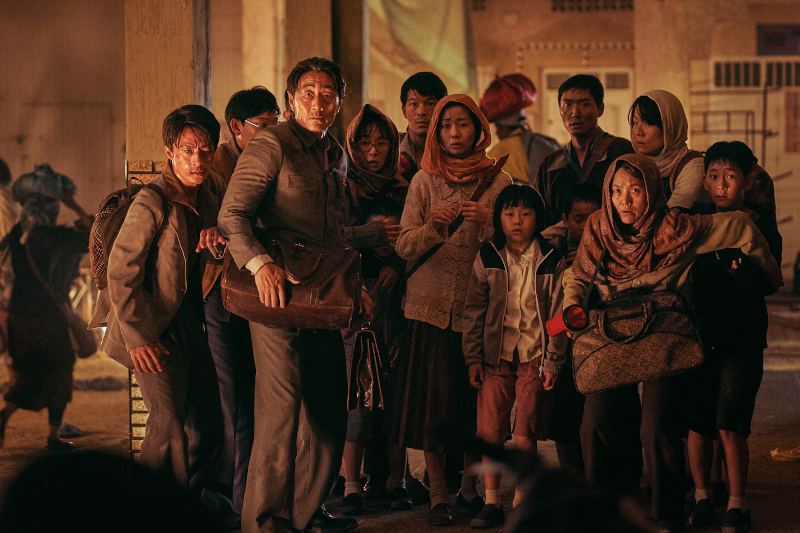Director – Ryu Seung-wan – 2021 – South Korea – Cert. 15 – 121m
****
In the early 1990s, besieged North and South Korean officials join forces to escape from the Somali capital as it descends into lawlessness – out in cinemas and VoD platforms on Friday, March 25th
In 1990, both North and South Korea have yet to have a seat at the United Nations. With many of those seats and hence the UN’s votes being held by African nations, influence in Africa is seen as the key to obtaining a seat. In Somalia, both sides are keen to ingratiate themselves with the ruling Barre military regime in Mogadishu, the capital, with a great deal of subterfuge and hostility between the two rival Korean factions.
However, the regime, which has held power for twenty years, is in trouble. (Barre would be ousted in 1991). As the capital becomes a war zone with government troops fighting rebel militias, the city descends into lawlessness and both sets of Korean representatives need to get out.
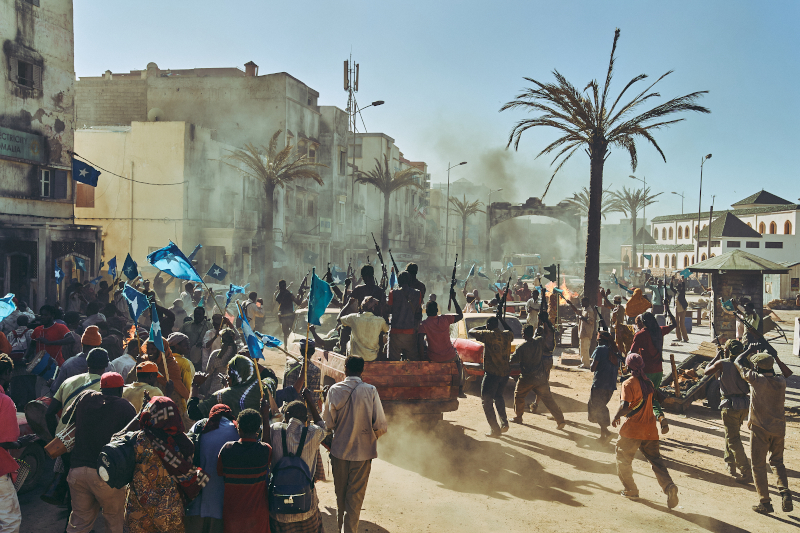
If you want a wider picture of the political realities of how all this came to pass in Somalia, this film is not the place to come. The clue is in the title: this is a Korean movie about Koreans having to depart a politically unstable country, and after some skullduggery at the start in which the car of South Korea’s Ambassador Han (Kim Yoon-seok from The Fortress, Hwang Dong-hyuk, 2017; 1987 When The Day Comes, Jang Joon-Hwan, 2017) is raided by bandits on its way to a meeting with President Barre the Southerners have taken months to set up, causing them to run to the meeting on foot and arrive 15 minutes late only to find the President can’t see them because he has another meeting immediately afterwards – with North Korea’s Ambassador Rim (Huh Joon-ho from Default, Choi Kook-Hee, 2018) who unbeknown to the Southerners hired the local bandits.
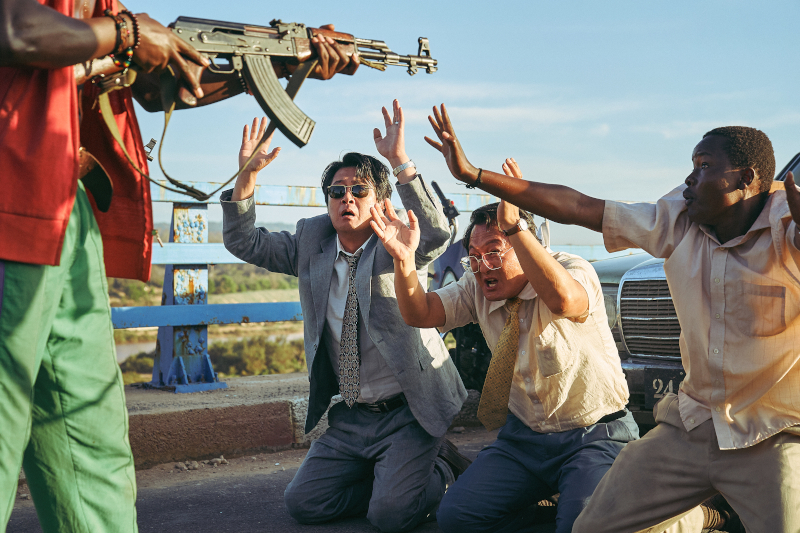
Ambassador Han has a bumbling assistant who arrives late for a diplomatic function and tears his jacket on a car door in the opening scene and new counsellor (i.e. security officer) Kang (Jo In-Sung from A Dirty Carnival, Yoo Ha, 2006) who arrives at the airport in the next scene which stresses the widespread corruption with a woman being stopped at customs and her valuable gem necklace confiscated. Ambassador Rim likewise has a security officer, Tae (Koo Kyo-hwan from Train To Busan Presents: Peninsular, Yeon Sang-ho, 2020). Actors Jo and Tae don’t look that dissimilar, and to foreigners unfamiliar with both actors it can be quite easy to confuse the two. Moreover, director Ryu isn’t particularly good at distinguishing the two groups and their embassy interiors from one another, making the early part of the plot sometimes difficult to follow.
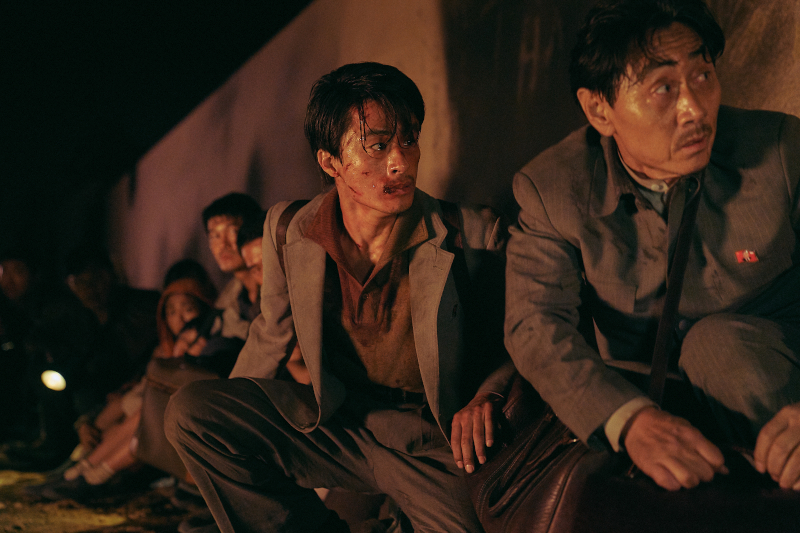
The rivalry between the two factions nevertheless makes for fascinating viewing, with each side essentially believing their own government’s propaganda demonising the other side. These hostilities are to some extent suspended after the North Koreans are raided, forced to flee their own embassy and seek refuge in its besieged South Korean counterpart where the local guards are demanding to be paid per number of people guarded, so will put the price up if the Southerners take the Northerners in. Both embassies have utilities cut off and dwindling food supplies. A sub-plot has the South Korean intelligence man attempt to forge defection documents for the Northerners to become Southerners.
With riots and gun battles raging in the streets, the two combined Korean factions decide to seek help at the Italian (friendly to South Korea) and Egyptian (friendly to North Korea) embassies. Commercial flights have ceased, so their only possible option turns out to be an Italian Red Cross flight that can take both groups. However, to board this they must get to the Italian embassy by 4pm that day, giving rise to the film’s most compelling action sequence: a convoy of cars, lined with ornamental hanging bags and any available books and doors taken off furniture to block or absorb incoming bullets, departs the beleaguered South Korean embassy for the Italian one. Incidents en route conspire to stop them getting there in time.
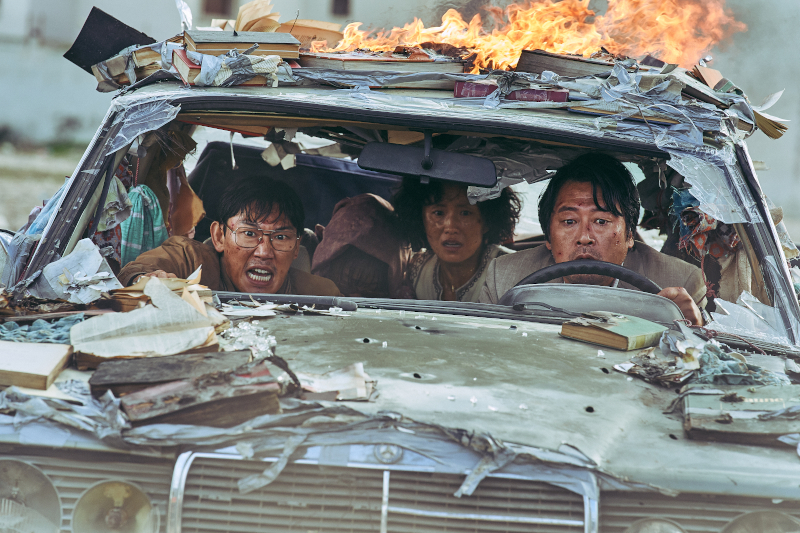
If director Ryu is generally far more adept at such big action set-pieces than political nuance or even clarity of storytelling, he achieves something of a coup when the plane lands in Kenya, with both sides having to say their farewells before disembarking, then having to ignore each other on the tarmac.
Despite being occasionally confusing, Escape From Mogadishu sweeps you up in its story of people fleeing a war-torn country, a plight which carries widespread significance, not least because of the situation in Ukraine at the present time when the film hits UK cinemas. Its faults are more than compensated for by the immediacy of such situations and the skill with which the mayhem of a country descending into war are rendered on the screen. Whether that factor will attract or repel audiences remains to be seen, although I personally was glad to have caught it.
Escape From Mogadishu is out in cinemas and VoD platforms in the UK on Friday, March 25th.
Trailer:
